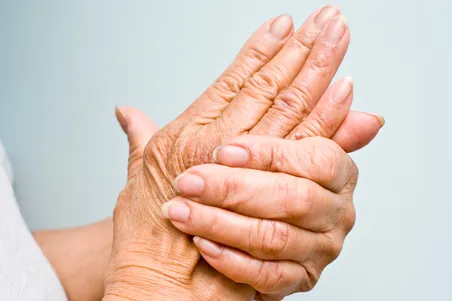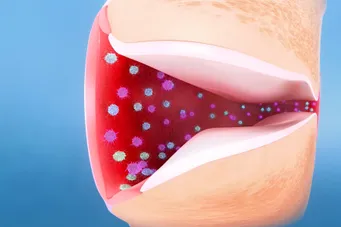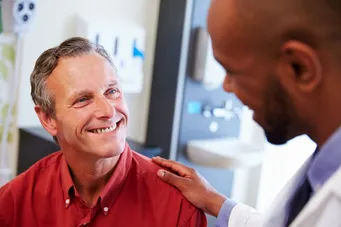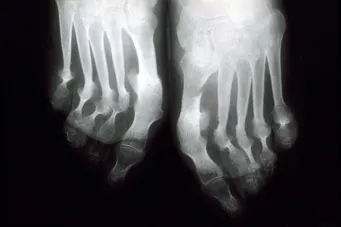The Toughest Trail
Reviewed by Poonam Sachdev on February 18, 2022
Video Transcript
Alicia Anderson: I've always
been very active.
I used to do
backpacking, running, biking.
I ran duathlons.
15,000 steps a day was my norm.
I like hiking and camping,
personally, because I live
in the city.
And I'm a country girl at heart.
In the woods, it feels like everything that is the day-to-day can just kind of float away. The day that I had my first real psoriatic arthritis flare, I was getting up to go to work. I couldn't grip my pants well enough to pull them up.
I couldn't get dressed. I couldn't move enough to actually go anywhere. The arthritis pain isn't like muscle soreness. It's kind of a combination of an ache that's turned up to 11 and sometimes stabbing pains. All the words we have to describe the effects of psoriatic arthritis are too small.
Aching is too small. Pain is too small. Fatigue is too small. It hurts way more than that. I went down from 15,000 steps a day to 10 steps a day. It was absolutely devastating.
Personally, I still feel like I'm giving up pieces of myself that there are things that I can never reclaim because of this illness. The fatigue is harder to push through than the pain. It feels like there is no way to get a full charge.
It was a revelation to discover Christine Miserandino's website about the spoon theory. She has lupus and was trying to explain the fatigue of her autoimmune disorder. It's super helpful for me, because it's the idea of budgeting energy.
Let's say I start the day with 12 spoons. I get up. I take a shower. I get dressed. That's two spoons gone. So and now I'm down to 10. Working might be two spoons. Walking the dog is easily four spoons. Sweeping the floor is a spoon. Cooking is two spoons if you're doing any sort of prep because you're using your wrists.
By the end of the day, you've got to make a decision about whether to spend the rest of that energy or bank it for the next day. Generally only a full night's sleep will give you kind of a reboot the next day. My old life, I had 20 to 30 spoons in a day. And now, I'm lucky if I have 10.
[RATTLING]
I was researching online alternative therapies. And acupuncture seemed to always be at the top of the list. I know it's not for everyone. But for me, it was a massive improvement.
I'm on three different medications. I do dietary changes, yoga, sleep a lot, like 12 hours a night. I try to get sunshine. I try to get exercise when I can. And I take it easy on myself.
[WHIRRING]
My husband has been super supportive and always trying to think of ways to make my life easier. He wanted me to feel like I could take a shower and enjoy it again. So he purchased this stool for the shower. For some reason, that stool felt like a symbol of my disability. It felt like I was giving up.
Assistive devices like that are all over my house now. Some of them were easier to accept than others. The stool was really hard. I really fought the cane as well. My husband -- he gets a lot of ideas about how to make me not resent the cane.
I have one cane that has a sword in it. [SIGHS] And we were actually in a shop. And they had trekking poles, like hiking poles. Having a trekking pole instead of a cane does make me a little bit less stubborn about it. It's still a cane.
But the canes helped me hike. The canes help me get outside. It's absolutely helped me get and stay more mobile. Having something as little as a stool when you're taking a shower can be the difference between going to the movies or not and having a life.
More than anything, the psoriatic arthritis has taught me that the overachiever kind of person that I was wasn't the healthiest way to go. Easy way isn't always the wrong way. The disease itself-- it forces me to just be. You've got to let go of that other person.
I've hiked 256 miles of the Appalachian Trail with a 40-pound pack on my back. I have to let that go. I still can get that feeling of wellness and well-being in the woods. It's just a much shorter trip than it used to be.
In the woods, it feels like everything that is the day-to-day can just kind of float away. The day that I had my first real psoriatic arthritis flare, I was getting up to go to work. I couldn't grip my pants well enough to pull them up.
I couldn't get dressed. I couldn't move enough to actually go anywhere. The arthritis pain isn't like muscle soreness. It's kind of a combination of an ache that's turned up to 11 and sometimes stabbing pains. All the words we have to describe the effects of psoriatic arthritis are too small.
Aching is too small. Pain is too small. Fatigue is too small. It hurts way more than that. I went down from 15,000 steps a day to 10 steps a day. It was absolutely devastating.
Personally, I still feel like I'm giving up pieces of myself that there are things that I can never reclaim because of this illness. The fatigue is harder to push through than the pain. It feels like there is no way to get a full charge.
It was a revelation to discover Christine Miserandino's website about the spoon theory. She has lupus and was trying to explain the fatigue of her autoimmune disorder. It's super helpful for me, because it's the idea of budgeting energy.
Let's say I start the day with 12 spoons. I get up. I take a shower. I get dressed. That's two spoons gone. So and now I'm down to 10. Working might be two spoons. Walking the dog is easily four spoons. Sweeping the floor is a spoon. Cooking is two spoons if you're doing any sort of prep because you're using your wrists.
By the end of the day, you've got to make a decision about whether to spend the rest of that energy or bank it for the next day. Generally only a full night's sleep will give you kind of a reboot the next day. My old life, I had 20 to 30 spoons in a day. And now, I'm lucky if I have 10.
[RATTLING]
I was researching online alternative therapies. And acupuncture seemed to always be at the top of the list. I know it's not for everyone. But for me, it was a massive improvement.
I'm on three different medications. I do dietary changes, yoga, sleep a lot, like 12 hours a night. I try to get sunshine. I try to get exercise when I can. And I take it easy on myself.
[WHIRRING]
My husband has been super supportive and always trying to think of ways to make my life easier. He wanted me to feel like I could take a shower and enjoy it again. So he purchased this stool for the shower. For some reason, that stool felt like a symbol of my disability. It felt like I was giving up.
Assistive devices like that are all over my house now. Some of them were easier to accept than others. The stool was really hard. I really fought the cane as well. My husband -- he gets a lot of ideas about how to make me not resent the cane.
I have one cane that has a sword in it. [SIGHS] And we were actually in a shop. And they had trekking poles, like hiking poles. Having a trekking pole instead of a cane does make me a little bit less stubborn about it. It's still a cane.
But the canes helped me hike. The canes help me get outside. It's absolutely helped me get and stay more mobile. Having something as little as a stool when you're taking a shower can be the difference between going to the movies or not and having a life.
More than anything, the psoriatic arthritis has taught me that the overachiever kind of person that I was wasn't the healthiest way to go. Easy way isn't always the wrong way. The disease itself-- it forces me to just be. You've got to let go of that other person.
I've hiked 256 miles of the Appalachian Trail with a 40-pound pack on my back. I have to let that go. I still can get that feeling of wellness and well-being in the woods. It's just a much shorter trip than it used to be.



